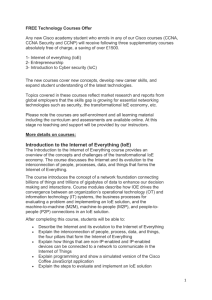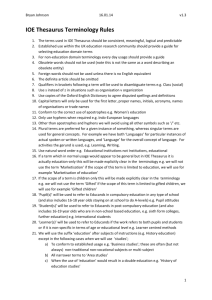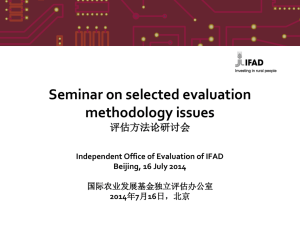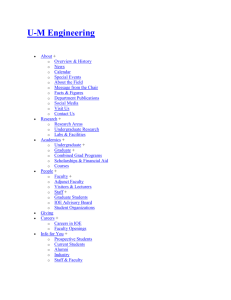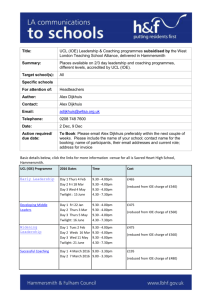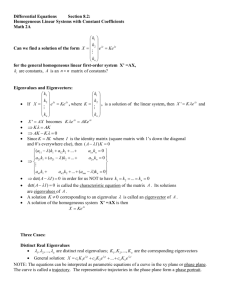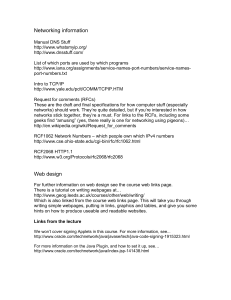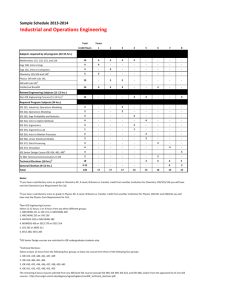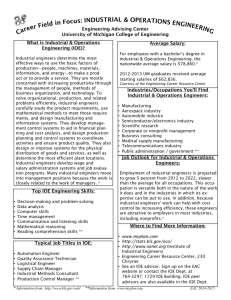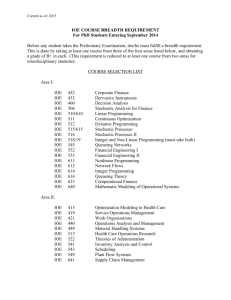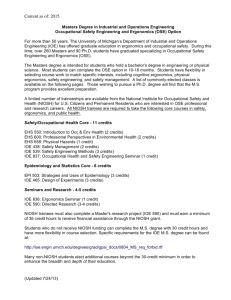Current as of: 2015 - Michigan Engineering
advertisement
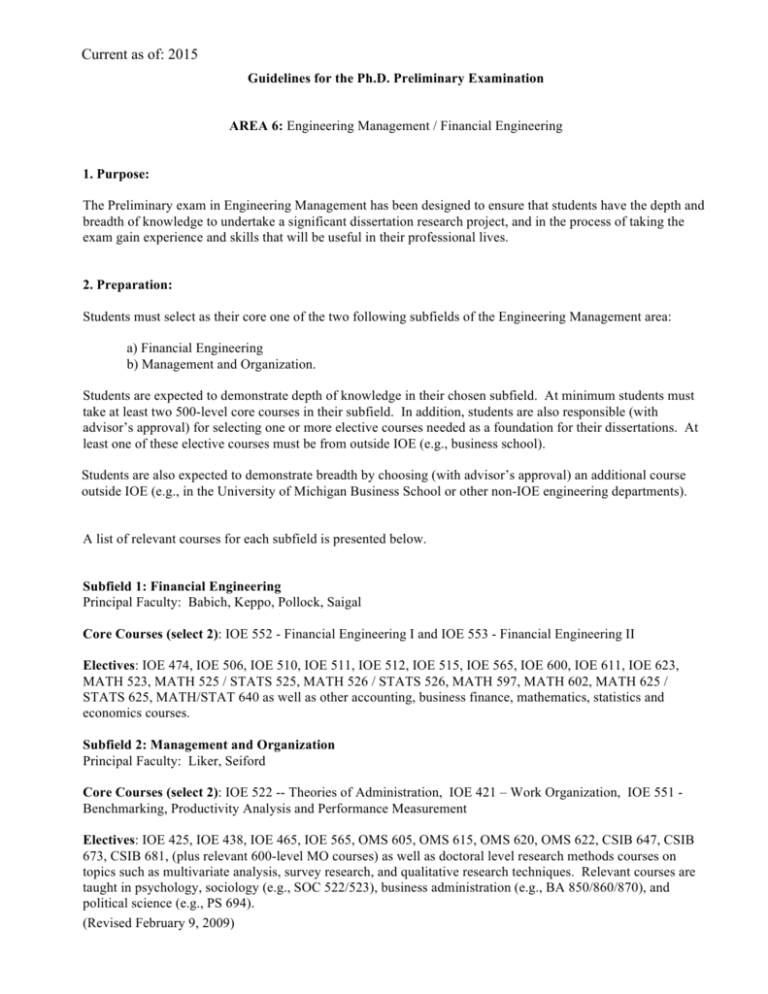
Current as of: 2015 Guidelines for the Ph.D. Preliminary Examination AREA 6: Engineering Management / Financial Engineering 1. Purpose: The Preliminary exam in Engineering Management has been designed to ensure that students have the depth and breadth of knowledge to undertake a significant dissertation research project, and in the process of taking the exam gain experience and skills that will be useful in their professional lives. 2. Preparation: Students must select as their core one of the two following subfields of the Engineering Management area: a) Financial Engineering b) Management and Organization. Students are expected to demonstrate depth of knowledge in their chosen subfield. At minimum students must take at least two 500-level core courses in their subfield. In addition, students are also responsible (with advisor’s approval) for selecting one or more elective courses needed as a foundation for their dissertations. At least one of these elective courses must be from outside IOE (e.g., business school). Students are also expected to demonstrate breadth by choosing (with advisor’s approval) an additional course outside IOE (e.g., in the University of Michigan Business School or other non-IOE engineering departments). A list of relevant courses for each subfield is presented below. Subfield 1: Financial Engineering Principal Faculty: Babich, Keppo, Pollock, Saigal Core Courses (select 2): IOE 552 - Financial Engineering I and IOE 553 - Financial Engineering II Electives: IOE 474, IOE 506, IOE 510, IOE 511, IOE 512, IOE 515, IOE 565, IOE 600, IOE 611, IOE 623, MATH 523, MATH 525 / STATS 525, MATH 526 / STATS 526, MATH 597, MATH 602, MATH 625 / STATS 625, MATH/STAT 640 as well as other accounting, business finance, mathematics, statistics and economics courses. Subfield 2: Management and Organization Principal Faculty: Liker, Seiford Core Courses (select 2): IOE 522 -- Theories of Administration, IOE 421 – Work Organization, IOE 551 Benchmarking, Productivity Analysis and Performance Measurement Electives: IOE 425, IOE 438, IOE 465, IOE 565, OMS 605, OMS 615, OMS 620, OMS 622, CSIB 647, CSIB 673, CSIB 681, (plus relevant 600-level MO courses) as well as doctoral level research methods courses on topics such as multivariate analysis, survey research, and qualitative research techniques. Relevant courses are taught in psychology, sociology (e.g., SOC 522/523), business administration (e.g., BA 850/860/870), and political science (e.g., PS 694). (Revised February 9, 2009) Current as of: 2015 3. Exam Coverage and Format: To make the exam a meaningful learning experience, it is designed to simulate common activities required of a Ph.D.-level professional. Professionals at this level are expected to keep up with literature in their field and related fields, write professional papers, and give professional presentations. Thus, the exam will be an oral exam, focused on preparing the student for their dissertation research. The students will be expected to write a dissertation proposal and tehn present and defend the proposal. Students must follow the following steps in preparation for the preliminary exam: 1. Form a Preliminary Examination Committee. The student must get agreement from each committee member presenting to them a written self-evaluation of preparedness to perform the proposed research, including brief description of the dissertation topic, a listing of the coursework already taken and any additional coursework planned (two page maximum). 2. Schedule date and time of oral defense in coordination with preliminary exam committee members (at least 4 weeks prior to the defense day). Inform the Graduate Program Office. 3. Submit the following materials to the Preliminary Exam Committee and the Graduate Program Office (2 weeks prior to the defense day). a) The final draft of the Dissertation Proposal according to NSF guidelines (http://www.nsf.gov/pubsys/ods/getpub.cfm?gpg ). b) A brief discussion of the resources (faculty advisors, lab/computational facilities, funding, etc.) needed to pursue the research (two page maximum. It is expected that the student will work closely with his/her advisor and committee members in developing the proposal and accompanying statements. 4. Defend the research proposal and the take-home exam (defense day). Students are expected to give a brief presentation (approximately 20 minutes) of their research proposal, and answer any questions covering the proposal and the planned dissertation research. 4. Suggested Topics A partial list of focus topics within each general topical area is attached to help students develop the "comprehensive" knowledge expected of a new professional in the area. This list should be used: • To help in the selection of other courses in the University which complement the topical areas. • To guide the student in the independent study of contemporary issues in the topical areas. • To help the student prepare for the research, paper preparation, presentation, and oral questioning, all of which are part of the preliminary exam. Specific Topics for Financial Engineering may include: • Knowledge of Financial Theory with special emphasis on asset pricing theory. • Knowledge of Information Technology with special emphasis of its uses in analyzing financial markets and their mechanisms. • Knowledge of Probability/Statistics and its integration with economic decisions. • Knowledge of Probability theory and Stochastic processes and their uses in creating and analyzing financial instruments. (Revised February 9, 2009) Current as of: 2015 • Knowledge of optimization and optimal control and its uses in deterministic and stochastic environments arising in portfolio analysis and financial markets. • Numerical methods and coding of algorithms with special emphasis of their uses in stochastic partial differential equations encountered in financial decisions. Specific Topics for Management and Organization may include: • Thorough understanding of open-systems theory as it underlies organizational design, sociotechnical systems, and organizational development and the ability to apply these general approaches at a basic level. • Understanding of the advantages and disadvantages of different general management theories and approaches (e.g., traditional management theory, participative management, sociotechnical systems, and organizational development). • Understanding of contemporary trends in business and process improvement such as lean, six sigma, theory of constraints. • Understanding of conceptual models in technology management, describing mechanisms of invention, innovation, and diffusion of technologies. • Knowledge in contemporary concurrent engineering and product development practices. • Familiarity with general research methods for testing among, and testing propositions within 1, alternative organizational theories. • The ability to analyze a case study applying a variety of organizational perspectives and recommend strategies for improvement consistent with these perspectives. • An ability to read and discuss organizational analysis literature critically. Revised June 28, 2010 (Revised February 9, 2009)
